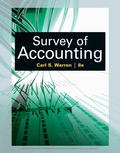
Survey of Accounting (Accounting I)
8th Edition
ISBN: 9781337517386
Author: WARREN
Publisher: Cengage
expand_more
expand_more
format_list_bulleted
Question
Chapter 8, Problem 8.3.1C
To determine
Concept introduction:
Common Stock:
The stock, also known as shares, which gives equity ownership and rights in the company in regard to voting for policies and to share profits of the company is termed as common stock.
Debt:
It is a liability of the company which it has to pay after a certain time along with a fixed rate of interest. This is used by the company for the expansion of the businesses.
To discuss:
The arguments on whether to classify the stock issuance as debt or not.
Expert Solution & Answer
Want to see the full answer?
Check out a sample textbook solution
Students have asked these similar questions
Financial accounting
need help this questions
What is the monthly break even in total dollar sales?
Chapter 8 Solutions
Survey of Accounting (Accounting I)
Ch. 8 - A business issued a $5,000, 60-day, 12% note to...Ch. 8 - Which of the following taxes are employers usually...Ch. 8 - Prob. 3SEQCh. 8 - Prob. 4SEQCh. 8 - A corporation has issued 25,000 shares of $100 par...Ch. 8 - For most companies, what two types of transactions...Ch. 8 - When are short-term notes payable issued?Ch. 8 - Prob. 3CDQCh. 8 - Prob. 4CDQCh. 8 - Identify the two distinct obligations incurred by...
Ch. 8 - A corporation issues $40,000,000 of 6% bonds to...Ch. 8 - The following data relate to an $8,000,000,7% bond...Ch. 8 - When should the liability associated with a...Ch. 8 - Prob. 9CDQCh. 8 - Prob. 10CDQCh. 8 - Prob. 11CDQCh. 8 - Prob. 12CDQCh. 8 - Prob. 13CDQCh. 8 - A corporation reacquires 18,000 shares of its Own...Ch. 8 - Prob. 15CDQCh. 8 - Prob. 16CDQCh. 8 - Prob. 17CDQCh. 8 - Prob. 18CDQCh. 8 - Effect of financing on earnings per share BSF Co.....Ch. 8 - Evaluate alternative financing plans Obj. 1 Based...Ch. 8 - Current liabilities Zahn Inc. -told 16.000annual...Ch. 8 - Notes payable Obj. A business issued a 90-day. 7%...Ch. 8 - Compute payroll An employee earns $28 per hour and...Ch. 8 - Prob. 8.6ECh. 8 - Prob. 8.7ECh. 8 - Prob. 8.8ECh. 8 - Bond price CVS Caremark Corp. (CVS) 5-3% bonds due...Ch. 8 - Issuing bonds Cyber Tech Inc. produces and...Ch. 8 - Accrued product warranty Back in Time Inc....Ch. 8 - Accrued product warranty Ford Motor Company (F)...Ch. 8 - Prob. 8.13ECh. 8 - Prob. 8.14ECh. 8 - Issuing par stock On January 29. Quality Marble...Ch. 8 - Issuing stock for assets other than cash Obj.5 On...Ch. 8 - Treasury stock transactions Obj.5 Blue Moon Water...Ch. 8 - Prob. 8.18ECh. 8 - Treasury stock transactions Banff Water Inc....Ch. 8 - Cash dividends The date of declaration, date of...Ch. 8 - Prob. 8.21ECh. 8 - Effect of stock split Audrey's Restaurant...Ch. 8 - Prob. 8.23ECh. 8 - Prob. 8.24ECh. 8 - Prob. 8.1.1PCh. 8 - Prob. 8.1.2PCh. 8 - Prob. 8.1.3PCh. 8 - Recording payroll and payroll taxes The following...Ch. 8 - Recording payroll and payroll taxes The following...Ch. 8 - Recording payroll and payroll taxes The following...Ch. 8 - Recording payroll and payroll taxes The following...Ch. 8 - Bond premium; bonds payable transactions Beaufort...Ch. 8 - Prob. 8.3.2PCh. 8 - Bond premium; bonds payable transactions Beaufort...Ch. 8 - Prob. 8.3.4PCh. 8 - Stock transactions for corporate expansion Vaga...Ch. 8 - Dividends on preferred and common stock Yukon Bike...Ch. 8 - Dividends on preferred and common stock Yukon Bike...Ch. 8 - Prob. 8.5.3PCh. 8 - Prob. 8.1.1MBACh. 8 - Prob. 8.1.2MBACh. 8 - Prob. 8.2.1MBACh. 8 - Prob. 8.2.2MBACh. 8 - Prob. 8.2.3MBACh. 8 - Prob. 8.3.1MBACh. 8 - Prob. 8.3.2MBACh. 8 - Prob. 8.3.3MBACh. 8 - Prob. 8.4MBACh. 8 - Prob. 8.5.1MBACh. 8 - Prob. 8.5.2MBACh. 8 - Prob. 8.6.1MBACh. 8 - Prob. 8.6.2MBACh. 8 - Prob. 8.6.3MBACh. 8 - Stock split Using the data from E8-22. indicate...Ch. 8 - Prob. 8.8.1MBACh. 8 - Prob. 8.8.2MBACh. 8 - Prob. 8.8.3MBACh. 8 - Prob. 8.8.4MBACh. 8 - Prob. 8.8.5MBACh. 8 - Prob. 8.8.6MBACh. 8 - Prob. 8.8.7MBACh. 8 - Prob. 8.8.8MBACh. 8 - Prob. 8.9.1MBACh. 8 - Prob. 8.9.2MBACh. 8 - Prob. 8.9.3MBACh. 8 - Prob. 8.9.4MBACh. 8 - Prob. 8.9.5MBACh. 8 - Prob. 8.9.6MBACh. 8 - Debt and price-earnings ratios Lowe's Companies...Ch. 8 - Prob. 8.10.1MBACh. 8 - Prob. 8.10.2MBACh. 8 - Prob. 8.10.3MBACh. 8 - Prob. 8.10.4MBACh. 8 - Prob. 8.10.5MBACh. 8 - Debt and price-earnings ratios Alphabet (formerly...Ch. 8 - Prob. 8.10.7MBACh. 8 - Prob. 8.10.8MBACh. 8 - Prob. 8.11MBACh. 8 - Prob. 8.1.1CCh. 8 - Prob. 8.1.2CCh. 8 - Prob. 8.2.1CCh. 8 - Prob. 8.2.2CCh. 8 - Prob. 8.3.1CCh. 8 - Issuing stock Sahara Unlimited Inc. began...Ch. 8 - Prob. 8.4CCh. 8 - Prob. 8.5.1CCh. 8 - Financing business expansion You hold a 30% common...
Knowledge Booster
Learn more about
Need a deep-dive on the concept behind this application? Look no further. Learn more about this topic, accounting and related others by exploring similar questions and additional content below.Similar questions
arrow_back_ios
SEE MORE QUESTIONS
arrow_forward_ios
Recommended textbooks for you
 Financial AccountingAccountingISBN:9781305088436Author:Carl Warren, Jim Reeve, Jonathan DuchacPublisher:Cengage Learning
Financial AccountingAccountingISBN:9781305088436Author:Carl Warren, Jim Reeve, Jonathan DuchacPublisher:Cengage Learning Financial AccountingAccountingISBN:9781337272124Author:Carl Warren, James M. Reeve, Jonathan DuchacPublisher:Cengage Learning
Financial AccountingAccountingISBN:9781337272124Author:Carl Warren, James M. Reeve, Jonathan DuchacPublisher:Cengage Learning Survey of Accounting (Accounting I)AccountingISBN:9781305961883Author:Carl WarrenPublisher:Cengage Learning
Survey of Accounting (Accounting I)AccountingISBN:9781305961883Author:Carl WarrenPublisher:Cengage Learning

Financial Accounting
Accounting
ISBN:9781305088436
Author:Carl Warren, Jim Reeve, Jonathan Duchac
Publisher:Cengage Learning

Financial Accounting
Accounting
ISBN:9781337272124
Author:Carl Warren, James M. Reeve, Jonathan Duchac
Publisher:Cengage Learning

Survey of Accounting (Accounting I)
Accounting
ISBN:9781305961883
Author:Carl Warren
Publisher:Cengage Learning
What Are Stock Buybacks and Why Are They Controversial?; Author: TD Ameritrade;https://www.youtube.com/watch?v=2O4bmcliaog;License: Standard youtube license